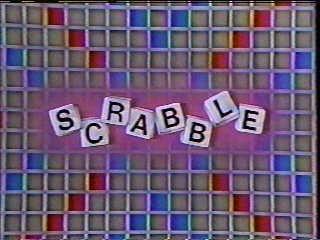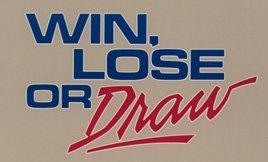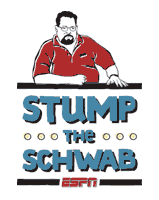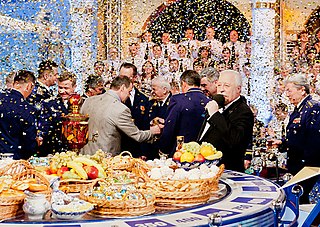Four contestants competed through six rounds of word puzzles. The lowest scorer at the end of every second round was eliminated. If one of these rounds ended with a tie for low score, a tiebreaker puzzle was played; a correct answer allowed the contestant to advance, while a miss eliminated them. Scores were reset to zero after each elimination.
Main game
During each of the first five rounds, the contestants were given a category that hinted at the solution of the puzzle and had to buzz-in before responding. An incorrect answer froze the contestant out of the next puzzle. Each of these rounds continued until time was called.
- Word Jumble: Unscramble a set of letters to form a word or phrase (1 point each).
- A.K.A.: Figure out a word or term based on an alternative description of it (2 points each).
- Word Smuggle: Find a word hidden as consecutive letters within a phrase (1 point each).
- Hangman: Guess a phrase as the letters are gradually filled in (2 points each).
- Invisible Link: Find a common word that can be placed before or after each of three given words to create new words or phrases (1 point each).
- Word Ladder: Given a starting three-letter word, change or add one letter at a time as instructed by the host to create a new one fitting the given category (2 points each). Both contestants played this round separately and had 60 seconds to make as many changes as possible.
Final: Safe Cracker
The high scorer after the Word Ladder round had a chance to win a cash jackpot by finding the correct seven-digit combination to a safe that held a cheque. They had 90 seconds to solve one puzzle of each of the six types used in the main game, and could play them in any order. Passing was allowed, but the puzzle did not change if the contestant returned to it later. Each correct answer was worth £50. The Word Ladder puzzle required the contestant to make only one change to the given word.
The combination used each of the digits 1 through 7 once. Every solved puzzle filled in the digit that corresponded to it (1 through 6, in the order that the rounds were played in the main game). If the contestant solved all six puzzles, the 7 was placed in the only still-empty slot and they won the jackpot automatically in addition to the £300 for the puzzles. If not, they had one chance to fill in the missing digits and open the safe. The jackpot began at £1,000 and increased by £500 per day until it was won.

Scrabble is an American television game show based upon the board game Scrabble. Contestants competed in a series of rounds to fill in words within a crossword puzzle for cash. Muriel Green of Exposure Unlimited developed the idea for a television game show based upon the board game concept. During 1983, Green convinced Selchow and Righter, who at that time owned the Scrabble board game, to license Exposure Unlimited to produce the game show. Exposure Unlimited co-produced the show with Reg Grundy Productions, and licensed the show to NBC. Scrabble aired on NBC from July 2, 1984, to March 23, 1990, and again from January 18 to June 11, 1993. Chuck Woolery hosted the program. Jay Stewart was the announcer for the first year. Charlie Tuna replaced him in mid-1985 and remained through the original run and the entirety of the 1993 revival.

Win, Lose or Draw is an American television game show that aired from 1987 to 1990 in syndication and on NBC. It was taped at CBS Television City, often in Studios 31, 33, and 43 at various times. It was co-produced by Burt & Bert Productions and Kline & Friends for Disney's Buena Vista Television. It has also had two versions on The Disney Channel: Teen Win, Lose or Draw from 1989 to 1992, and a revived version known as Disney's Win, Lose or Draw which aired in 2014. New York described Win, Lose or Draw as "a knockoff" of the board game Pictionary, however, Burt Reynolds and Ed McMahon referred to playing the game at Burt's home during the August 2, 1978 episode of The Tonight Show, with Johnny Carson, three years before Pictionary was created.

Now You See It is an American television game show created by Frank Wayne for Mark Goodson-Bill Todman Productions. The object of Now You See It is to answer general knowledge trivia questions by finding the answers hidden in a grid, similar to a word search puzzle.

Chain Reaction is an American television game show created by Bob Stewart, in which players compete to form chains composed of two-word phrases.
Double Talk is an American game show that aired on the ABC network from August 18 to December 19, 1986. The show was a Bob Stewart-produced word game which borrowed elements from Stewart's previous show Shoot for the Stars and his then-current editions of Pyramid.

Think Fast is an American children's game show which aired on Nickelodeon from May 1, 1989, to March 30, 1990, with reruns airing weekly until June 29, 1991.

The $1,000,000 Chance of a Lifetime is an American game show which offered a $1 million (annuitized) grand prize to winning contestants. The show aired in syndication from January 6, 1986, until May 22, 1987. The show was hosted by Jim Lange, and he was joined by Karen Thomas as co-host during the second season. Mark Summers was the show's announcer for the first few weeks and Johnny Gilbert announced the remainder of the series. The show was produced by XPTLA, Inc., and distributed by Lorimar-Telepictures.

Stump the Schwab is an American game show that aired on ESPN2 and ESPN Classic from July 8, 2004 to September 29, 2006. The show featured three contestants trying to defeat Howie Schwab, ESPN's first statistician, in a sports trivia contest. Stuart Scott was the show's host. The show also appeared on Canada's The Score Television Network.
BrainTeaser was a British game show based on the original Dutch format of Puzzeltijd. The show was broadcast live, with phone-in viewer puzzles being announced and played during the show in addition to the studio game. During its run from 5 August 2002 to 7 March 2007, it aired on Five Mondays to Fridays, usually for an hour around lunchtime, and was fronted by various presenters rotating with one another. Beginning in August 2005, a version of the show that exclusively focused on viewer participation was broadcast in a four-hour long block on YooPlay TV every day after the Five broadcast, as part of a thirteen-week trial.

Game Ka Na Ba?, formerly Pilipinas Game Ka Na Ba is a Philippine game show created by ABS-CBN Studios. The main goal of the game is to win 2 million pesos by answering trivia questions.
Smush is an American game show which aired on the USA Network on December 3, 2001, to June 21, 2002. Hosted by Ken Ober and Lisa Dergan, the show features contestants competing to form a portmanteau given clues.

The Field of Wonders is a Soviet, later Russian adaptation of the U.S. game show Wheel of Fortune produced by VID, provided with elements of Russian culture and hosted by Leonid Yakubovich.
PDQ and Baffle are American television game shows created by Heatter-Quigley Productions. Both shows' objective was for contestant/celebrity teams to guess a given word or phrase in the shortest amount of time with the fewest letters given as possible.

The Vault is a British game show based on the original Israeli version called HaKassefet Hebrew: הַכַּסֶפֶת) that aired on ITV from 11 May 2002 to 24 August 2004. It was first hosted by Davina McCall in 2002, then hosted by Melanie Sykes from 2003 to 2004 and finally hosted by Gabby Logan who stepped in for Sykes for the latter half of 2004 when Sykes went on maternity leave.
Camouflage was an American television game show that aired on Game Show Network. Hosted by Roger Lodge, and billed as "the hidden word game where the answer is always right in front of you", Camouflage originally aired for 40 episodes from July 2 to 27, 2007. The show is a word game, with contestants searching for a hidden word or phrase in a string of jumbled letters. The show is produced by Enjoy the Ride Productions in association with McB Entertainment.

There are two Philippine versions of Wheel of Fortune. The first was aired on ABC aired from November 19, 2001 to May 31, 2002. It was hosted by Rustom Padilla and Victoria London. The second and more recent one was a program that aired on ABS-CBN, with Kris Aquino as main host, while Zara Aldana and Jasmine Fitzgerald alternated as puzzle assistants for each puzzle. Aquino's version started on January 14, 2008, replacing the second season of Kapamilya, Deal or No Deal.
Download is an Australian children's game show which aired on the Nine Network from 2000 until 2002. Scott McRae hosted the show in 2000–2001; he was replaced by Nathan Lloyd in 2001–2002, while Emily Jade O'Keefe hosted the final season of the show. The co-host for the final season was Miss Bytes.
Alphabetical is a game show that aired on ITV from 15 August 2016 to 27 October 2017, hosted by Jeff Stelling. It is largely based on the Spanish quiz show Pasapalabra, which itself was derived and iterated from the BBC panel show The Alphabet Game.

People Puzzler is an American television game show hosted by Leah Remini and broadcast by Game Show Network as well as in syndication. It premiered on January 18, 2021. The show is inspired by the celebrity and pop-culture themed crosswords in People magazine.

Tug of Words is an American television game show that aired on Game Show Network from November 8, 2021 to February 15, 2023.













